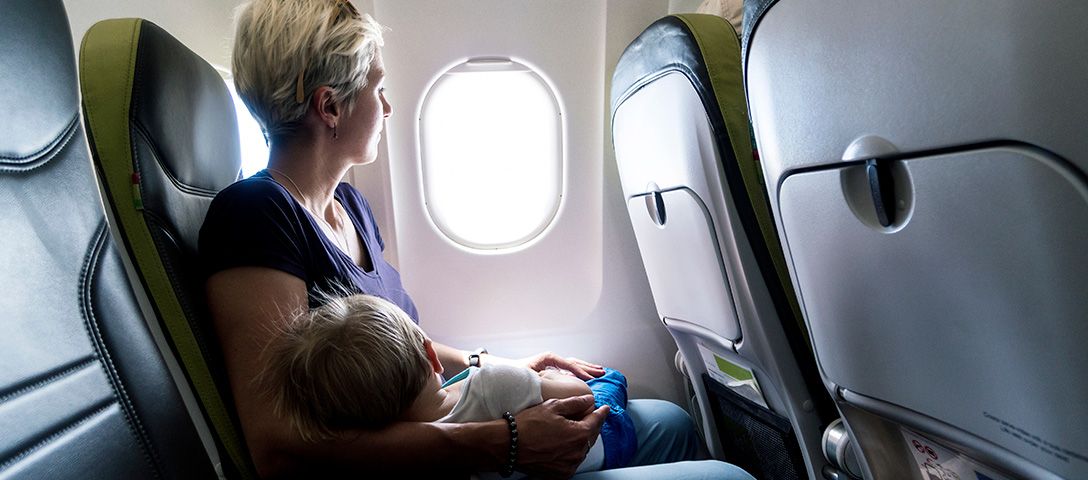Talking about baby travel 15-20 years ago, parents used to take their precious little ones on flights when they were at least 3 years old. Nowadays, with our fast-paced technological development of the aviation industry, parents aren’t afraid of taking a baby on a plane even if he didn’t reach the age of 2, and even on a long-haul flight.
Nonetheless, traveling with a newborn or a toddler under the age of two is still a reason for the distress of any parents since air trips can be quite stressful for adults, not to mention babies. And as we all know, babies are more sensitive therefore, traveling with baby on plane without a plan is risky and absolutely unthoughtful. So, Airflyby Travel Blog will provide some advice on how to travel with a baby under the age of two and win at it.
Basic Tips to Follow When Flying With a Toddler Under 2
- You can travel with a newborn by plane if he’s older than a week. If your baby has to be taken on a flight, you will have to provide a medical certificate to prove that he is able to fly without any health risks.
- In case your little one caught a cold, he has a runny nose, sore throat, or ear, better postpone your trip by air until he gets well.
- The optimal time for a baby to be on a flight is at most 4 hours. But, that doesn’t mean your baby can’t be taken on a long-haul flight. Infants are surprisingly good at flying for long periods, nonetheless, it is a stressful situation, after all. If you decide on taking an infant on a plane, the more desirable option would be to choose a direct or non-stop flight. That way, you will reduce the number of take-offs and landings, thus, your baby won’t have to experience this painful part of flight so many times.
- When going on a vacation with a baby under the age of 2, pick a location that will resemble the same climate as where you live. By doing so, your baby won’t be bothered by a harsh climate change that even adults aren’t fond of.
- Pick the time of the flight when your baby is more likely to be sleeping. Considering this said, nighttime flights might be the optimal time for a baby air travel.
- You are allowed taking baby stroller on flights. Give it away at the departure gate and you’ll receive it right back when you disembark the air vessel.
- Bringing car seat on plane can be more comfortable both for you and your baby. Some airlines will allow you to bring one free of charge, but make sure to comply with their rules.
- You might be provided with a baby bassinet on request on specific airline flights, but check if there is one available and lock in a reservation at least 24 hours prior to your flight.
Consult your baby’s physician before the travel
Getting recommendations right from your baby’s physician will calm your nerves and will answer some of your questions regarding your flight with a baby under the age of 2. Does my baby need a vaccine? What to pack for a two-week trip with my baby? How to organize a first aid kit? These and other questions can be asked and will be definitely answered.
Don’t be too nervous
Your baby can feel you really well. Babies, in general, distinguish the mood of their parents extremely accurately. Hence, maintaining your composure is the key to a successful and stress-free flight for your baby and yourself. If you stay relaxed, your baby won’t be fussy despite the change of environment, as the only thing your baby wants is to feel protected.
Learn as much as possible before taking your baby on a flight
Make sure you know the location of your accommodation, the infrastructure of the city, the duration of your flight to put your mind at ease when you are at the destination. Consequently, such questions as ‘where can I buy baby food in this country?’ or ‘how to get to the hotel?’ won’t bother your mind when you reach the destination.
Packing Luggage for Plane Rides with a Baby
What to bring on a flight with a baby
When you travel with an infant or a toddler under the age of 2, bring items aboard a plane that your little bundle of joy will definitely need. Include enough water, formula, unopened baby food in your carry-on. As you may know, there are several restrictions regarding liquids in a carry-on, but these are not applied to baby food. The only thing you have to think about is the amount you should take, as baby food is advised to be taken in reasonable quantities.
Make sure to bring enough baby food on plane for the whole duration of the flights itself, your way to the airport, and to the place of your accommodation. And bring some extra in case there is a delay or any other unexpected occurrences happen. Pack in your carry-on diapers (at least twice as much), wet towels and napkins (2-3 packs), baby toiletries, changing clothes (including yourself), warm clothes, and a blanket or two. This way, you’ll protect yourself from unforeseen events, and your baby will be dry, warm, and happy.
Entertaining baby on plane is the key factor to an unfussy and joyful baby. Hence, bring on plane toys and entertainment items that will keep your baby occupied. Many parents buy new toys exclusively for a flight, as these might keep them entertained for a longer time.
What to bring on vacation with a baby
Even if you know you will be able to buy baby food at your destination, make sure you bring some, to stay out of risk. The store with baby food can be closed, the flight can be delayed, and your luggage can be lost. Talking about the quantities, it is always safe to ask the air carrier about how much baby food can be packed in a carry-on.
When traveling with an infant or a toddler under the age of 2 who is fed with specialized food, make sure you carry enough for the whole journey in case there are no analogs at the destination. Get informed prior to the trip whether you will be able to purchase some aboard or not, as changing your baby’s diet is not the best idea.
Aboard with a Baby
Help your baby during the take-offs and landings
When proceeding to take a flight with a baby, know that the most uncomfortable time of the plane ride is the take-off and the landing. During these times, our ears are hurting as the pressure changes inside the cabin. So do your baby’s ears. Babies are even more sensitive to the change of pressure, as their blood vessels are smaller, so do their nasal airways.
While we, adults, can take a pill to ease the pain, babies can be helped the other way. Just make him drink some water or feed him during take-off or landing. The swallowing action relieves the pain and stabilizes the pressure. But it has to be noted that babies who got allergies or even a small cold can’t be taken on flights as it might aggravate the situation. In case you have to travel with a baby under 2, but he caught a cold or has allergies, consult a physician who will prescribe some medicine and will give useful advice.
Don’t feed your baby with plane food.
Among the things to take on plane for toddlers under the age of 2 is definitely the food. Plane food is not the best one, as you know. That is explained by the fact that our taste buds are less receptive to high altitudes, that’s why it seems to be really bland. And that’s why some airlines are adding a lot of spices, salt, and other seasonings, and therefore make it less dull.
It is totally up to you to enjoy a plane meal or not, but, please, do not feed your baby with it. That quantity of seasoning can be dangerous for your baby. And, as salt and other seasonings retain liquids in bodies, these can affect the normal function of the baby's organs.
Baby Medical Insurance and Health
You have to buy a baby medical insurance, as this is really important. Unforeseen events can occur at any time, so it is better to be prepared. Health care services for newborns, infants, and toddlers under the age of 2 are among the most expensive services. For that reason, purchasing a baby medical insurance can secure you from paying off outrageous medical bills.
- The first thing you should do is to select the right insurance. Look up carefully what services are included in the insurance. Does the insurance cover medical expenses in case of trauma, unforeseen occurrences, or illness? Does it include medical consultations, or does it cover additional expenses on medicines, or inpatient and outpatient care? All of these should be included in the baby's medical insurance. A great bonus is a diagnosis, emergency vaccinations, and other emergency services.
- Get informed who is partnering with the insurance company. Remember, the insurance company is just a coordinator, not an executor.
- Make sure you are in roaming, and you have sufficient money on your phone balance to be able to make an emergency call to the insurance company or the medical institute.
- Bring a credit card. In case there is no possibility to cover some of the expenses with your baby medical insurance, you would want to pay with your credit card.
- Last but not least, do not panic. In the moment of unexpected bad occurrences, do your best to keep your mind sharp. Make a rough plan to avoid chaotic actions. Call the doctor and the insurance company, say the insurance number, and speak about what happened. Seek medical attention as fast as you can, and if insurance services aren’t available at that moment, say that you will pay for it. If you save all the bills, the insurance company will cover them later.
There is no reason to worry about traveling with baby on plane even if he didn’t reach the age of 2 yet. The best thing you can do for your baby and for yourself is to have a plan and know what you have to do in a specific situation. If you follow the above-mentioned tips, you are going to win at traveling with a baby by air. Airflyby Team wishes you happy travel with your little bundle of joy!
Last Updated on December 17, 2019.

